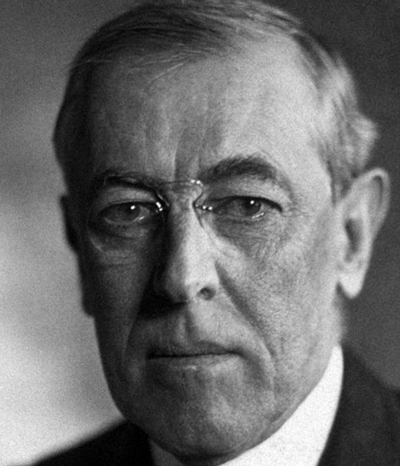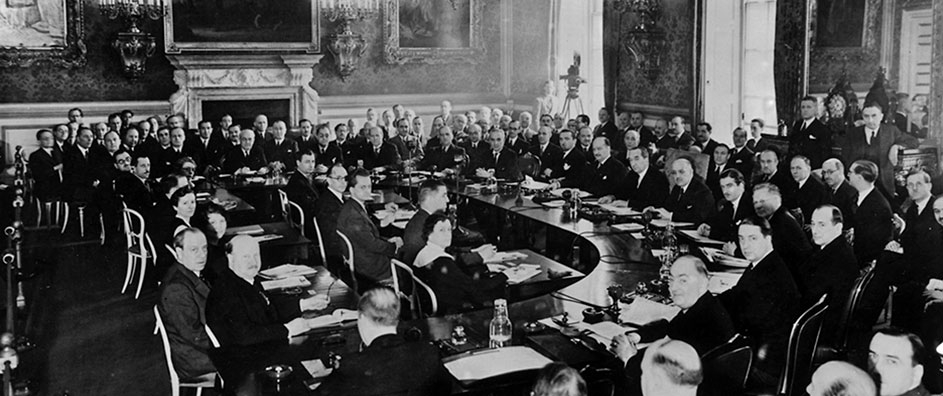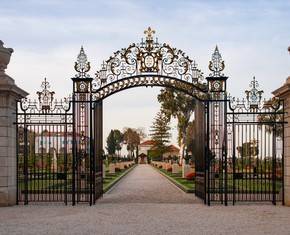The views expressed in our content reflect individual perspectives and do not represent the authoritative views of the Baha'i Faith.
In 1920, after the grim toll of World War I had begun to penetrate the world’s consciousness, people finally attempted global governance—the League of Nations.

President Woodrow Wilson
The first international organization with a mandate to maintain world peace got its start at the Paris Peace Conference of 1918. There, four men—Woodrow Wilson, the US President; Georges Clemenceau, France’s Prime Minister; David Lloyd George, the UK’s Prime Minister; and Vittorio Orlando, Italy’s Prime Minister—decided the fate of the world and redrew its national boundaries.
Those “victors” in WWI, the so-called “Big Four” met 145 times. They dictated the Treaty of Versailles with Germany and the four other treaties with the losing nations; divided up those nations’ former colonies; decided on the borders of the new nations, including in the Middle East; determined the reparations Germany and its allies would pay; and agreed to form the League of Nations.
The League had structural problems from the start. Its forerunner—the Inter-Parliamentary Union, formed by peace activists William Randal Cremer and Frederic Passy in 1889—had no provision for including nations without a parliamentary system of government, and the League of Nations repeated that Euro-centric mistake. The League, a relatively powerless structure with a small budget, no way to enforce its decisions and only 58 member nations at its peak, never did represent the whole world. It existed for 26 years, but fell apart when it couldn’t stop World War II.
Historians agree that the decisions made at the Paris Peace Conference directly contributed to the conditions that led to WWII. Famously, the Treaty of Versailles, in section 231, blamed WWI on “the aggression of Germany and her allies.” This provision humiliated the Germans, and forced their government to pay unrealistic reparations that helped cause the enormous inflation during Germany’s Weimar Republic period—and led to the rise of German fascism, which sparked World War II. Abdu’l-Baha predicted that the Paris Peace Conference and the subsequent creation of the League of Nations would fail, in this December 1919 letter to the Central Organization for a Durable Peace in the Hague:
… although the League of Nations has been brought into existence, yet it is incapable of establishing Universal Peace. But the Supreme Tribunal which His Holiness Baha’u’llah has described will fulfil this sacred task with the utmost might and power. And His plan is this: that the national assemblies of each country and nation—that is to say parliaments—should elect two or three persons who are the choicest men of that nation, and are well informed concerning international laws and the relations between governments and aware of the essential needs of the world of humanity of this day. The number of these representatives should be in proportion to the number of inhabitants of that country. The election of these souls who are chosen by the national assembly, that is, the parliament, must be confirmed by the upper house, the congress and the cabinet and also by the president or monarch so these persons may be the elected ones of all the nation and the government. From among these people the members of the Supreme Tribunal will be elected, and all mankind will thus have a share therein, for every one of these delegates is fully representative of his nation. When the Supreme Tribunal gives a ruling on any international question, either unanimously or by majority-rule, there will no longer be any pretext for the plaintiff or ground of objection for the defendant. In case any of the governments or nations in the execution of the irrefutable decision of the Supreme Tribunal, be negligent or dilatory, the rest of the nations will rise up against it, because all the governments and nations of the world are the supporters of this Supreme Tribunal. Consider what a firm foundation this is! But by a limited and restricted League the purpose will not be realized as it ought and should. – Abdu’l-Baha, Tablet to the Hague, p. 10.
Baha’is see this forward-looking formulation—an actual, inclusive and democratic league of nations, a supreme, universally-representative global tribunal without the political restrictions and the deference to and control of the most militarily-powerful countries—as the true goal of a harassed and fractious world. This analysis, written by the Guardian of the Baha’i Faith in 1938, contends that despite the League’s obvious shortcomings, we can start to envision a way forward:
The League of Nations, its opponents will observe, still lacks the universality which is the prerequisite of abiding success in the efficacious settlement of international disputes. The United States of America, its begetter, has repudiated it, and is still holding aloof, while Germany and Japan, who ranked among its most powerful supporters, have abandoned its cause and withdrawn from its membership. The decisions arrived at and the action thus far taken, others will maintain, should be regarded as no more than a magnificent gesture, rather than a conclusive evidence of international solidarity. Still others may contend that though such a verdict has been pronounced, and such pledges been given, collective action must, in the end, fail in its ultimate purpose, and that the League itself will perish and be submerged by the flood of tribulations destined to overtake the whole race. Be that as it may, the significance of the steps already taken cannot be ignored. Whatever the present status of the League or the outcome of its historic verdict, whatever the trials and reverses which, in the immediate future, it may have to face and sustain, the fact must be recognized that so important a decision marks one of the most distinctive milestones on the long and arduous road that must lead it to its goal, the stage at which the oneness of the whole body of nations will be made the ruling principle of international life. – Shoghi Effendi, The World Order of Baha’u’llah, p. 192.
Abdu’l-Baha concluded his important 1914 letter about war and peace to the British Baha’i author Beatrice Irwin with this prayerful lament and plea to God for the end of such horrendous wars—and the establishment of Baha’u’llah’s vision of a world confederation of nations:
O people! I weep and cry, lament and bemoan your fate. Then hasten ye, hasten ye, perchance ye may become able to extinguish with the water of the new-born ideals of spiritual democracy and celestial freedom, this many-flamed, world-consuming fire, and through your heaven-inspired resolution you may usher in the Golden Era of International Solidarity and World Confederation.
O kind God! Hearken to the cry of these helpless nations! O pure Lord, show Thy pity to these orphaned children! O incomparable Almighty, stop this destructive torrent! O Creator of the world and the inhabitants thereof, cause the extinction of this burning fire! O Listener to our cries, come to the rescue of the orphans! O Ideal Comforter, console the mothers whose hearts are torn and whose souls are filled with the blood of irremediable loss! O Clement and Merciful, grant the blessing of Thy grace to the weeping eyes and burning hearts of the fathers. Restore calmness to this surging tempest and change this world-encircling war into Peace and Conciliation.
Verily, Thou art the Omnipotent and the Powerful and, verily, Thou art the Seer and the Hearer!
















Comments
Sign in or create an account
Continue with Googleor